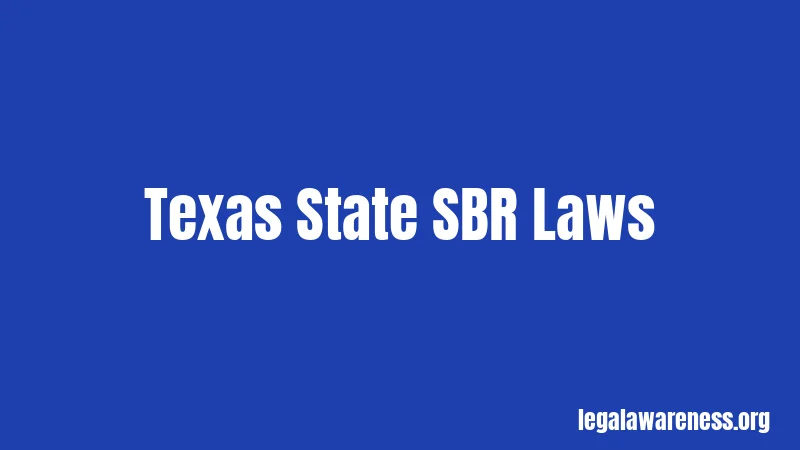SBR Laws in Texas (2026): What Gun Owners Really Need to Know
Most gun owners have heard the term “SBR” at some point. But honestly, the rules around short-barreled rifles can get confusing fast. In Texas, where gun rights run deep, SBR laws are actually pretty specific. And they’ve changed more recently than many people realize. Let’s break down exactly what you need to know.
Here’s the thing: federal law and Texas state law don’t always agree on everything. That’s where it gets tricky. You could be totally legal under Texas rules but run into federal problems. Yep, that’s all you need to keep in mind as we go through this.
What Is a Short-Barreled Rifle?

A short-barreled rifle (SBR) is any rifle with a barrel shorter than 16 inches. It’s that simple. The length matters because it affects how the federal government classifies and regulates firearms.
Let’s say you have an AR-15. If you put a 14-inch barrel on it, that’s an SBR. The frame and receiver matter too. If it’s designed to be fired from the shoulder, it counts. It doesn’t matter what you call it or what you intended it to be. The barrel length is what defines it legally.
The reason these restrictions exist goes back decades. Lawmakers were concerned about concealability and criminal use. Whether you agree with that reasoning or not, the laws are on the books. And they’re enforceable.
Federal SBR Laws
Here’s where it gets important. Federal law heavily restricts short-barreled rifles. You can’t just walk into a gun store and buy one like you would a standard rifle.
To legally own an SBR federally, you need to register it with the ATF (Bureau of Alcohol, Tobacco, Firearms and Explosives). You also need to pay a $200 tax stamp. This isn’t optional. Skipping it is a federal crime, not just a fine.
The process takes time. You fill out a Form 4 (if you’re buying an existing SBR) or a Form 1 (if you’re building one yourself). Then you wait. The ATF has to approve your application. This used to take months. Now it’s faster but still takes several weeks usually.
Wait, can you actually build your own? Yes, you can. Many gun enthusiasts do exactly that. But again, you need the Form 1 approval and the $200 tax stamp before you do it. Building one without approval is a federal felony. That’s not a misdemeanor. That’s serious prison time.
Texas State SBR Laws

Now here’s where Texas gets interesting. Texas state law is actually more permissive than federal law in many ways. Stay with me here because this matters.
Texas doesn’t have a separate state restriction on barrel length. That might sound like good news. And in some ways, it is. But here’s the catch: federal law still applies. You can’t hide behind Texas law and ignore federal requirements.
Think of it like this. If federal law says you need a permit, Texas saying “we don’t require one” doesn’t give you permission to skip the federal permit. You still need it. Both sets of rules apply to you at the same time.
In 2023, Texas passed constitutional carry legislation. This lets you carry firearms without a state permit. But it doesn’t change the SBR situation at all. Federal restrictions still stand. Constitutional carry doesn’t apply to federally restricted weapons.
The Registration Requirement
This is probably the most important part. If you own an SBR, it must be registered with the ATF. No exceptions. Not if you inherited it. Not if you built it yourself. Not if you swear you didn’t know the barrel was short.
Wondering if your rifle qualifies? If the barrel is under 16 inches and it fires from the shoulder, yes. It’s an SBR. The color, brand, or style doesn’t matter. Only the barrel length and firing method count.
The registration process involves submitting your fingerprints, getting a background check, and paying the $200 tax. You’ll get a tax stamp. Keep that stamp with your rifle. Always. Law enforcement can ask to see it.
Honestly, this is the part most people miss. They think the federal rule is weird or unfair. So they don’t register. That’s when problems start.
What About Pistol Braces?

Here’s where it gets tricky. A few years back, people started using something called pistol braces. These attach to the back of a rifle. They’re designed to stabilize the gun like a brace stabilizes a wrist.
Gun makers and owners argued that a rifle with a pistol brace is technically a pistol, not a rifle. Since it’s a pistol, barrel length restrictions don’t apply. Sounds logical, right?
The ATF agreed with this for years. Then they changed their mind. In 2023, they issued new guidance saying that most pistol braces turn rifles into SBRs. If it looks like a rifle, fires like a rifle, and you use it like a rifle, it’s an SBR. The brace doesn’t change that.
This created a major situation. Thousands of people suddenly owned unregistered SBRs. The ATF gave them a grace period to comply. That period ended. Now, you need to register those rifles or remove the brace and register the barrel as an pistol.
Not sure if you have this situation? It’s confusing because the rules apply based on how the gun functions, not just how it’s built. If your setup could reasonably be fired from the shoulder, it probably counts as an SBR. When in doubt, register it.
Building Your Own SBR
Some gun enthusiasts want to build their own short-barreled rifles. You can do this legally, but there’s a specific process.
First, get your Form 1 approved before you build anything. You submit your application to the ATF with photos and details of what you plan to build. They’ll check your background and verify you’re allowed to own it. Once approved, you get your tax stamp.
Only after you have that approval can you actually assemble the rifle. Assembling it first is a felony. That’s a big deal. Not doing this correctly can result in federal charges.
Second, you need to understand what you’re building. Just having the right parts isn’t enough. The assembled firearm has to meet the legal definition. If you’re unsure, talk to someone who knows. A mistake here costs way more than getting expert help.
Penalties and Consequences
What happens if you break these rules? The penalties are serious. We’re not talking about a fine and a warning here.
Possessing an unregistered SBR is a federal felony. You could face up to 10 years in prison and fines up to $250,000. That’s per firearm. If you have two unregistered SBRs, those penalties stack.
Even accidentally violating the law doesn’t save you. Intent doesn’t matter much with SBRs. If you didn’t register it and you own it, you’ve broken the law. Ignorance isn’t a valid defense.
In Texas, state charges could add on top of federal charges. You might face both. That means federal prison time plus state prosecution. This happens more often than people realize.
License suspension happens too. If you’re convicted of a federal firearm felony, you lose your right to own any gun. Not just short-barreled rifles. Any firearm. Ever. For some people, that’s devastating.
Think of it like this. It’s similar to drug possession charges but with firearms. The severity is comparable. The federal system takes these violations seriously.
Legal Ownership Made Simple
Okay, so how do you actually own an SBR legally in Texas? Here’s what you need to do.
Step one: Fill out the ATF Form 1 or Form 4 (depending on whether you’re building or buying). You can get these forms at the ATF website.
Step two: Include your fingerprints. The ATF wants them on file. You usually get these done at a local gun store or law enforcement agency.
Step three: Pay the $200 tax stamp. This goes to the federal government. It’s not optional.
Step four: Wait for approval. Check your application status online. Most approvals take 4-8 weeks now, though it varies.
Step five: Once approved, you’ll get your tax stamp. Keep it in a safe place with your rifle. Never separate them.
Step six: Register it in any state database if required. Texas doesn’t have a separate registration system, but the ATF registration is your federal record.
That’s it. Honestly, it’s not complicated once you understand the steps. Thousands of people do this every year without problems.
Traveling With Your SBR
Here’s something that surprises people. You can’t just travel across state lines with an SBR whenever you want.
Some states allow SBRs with proper registration. Others don’t allow them at all. If you’re traveling and you’re bringing an SBR, you need to know the laws where you’re going.
Take Arkansas, for example. Arkansas allows SBRs with federal registration. You can drive there with your registered SBR without extra paperwork.
But California doesn’t allow SBRs at all. Even with federal registration and a tax stamp, you can’t bring an SBR into California. Period. That’s state law trumping federal compliance.
So before you road trip with your SBR, check the laws where you’re headed. A quick call to that state’s fish and wildlife department or police department can save you huge problems.
Frequently Asked Questions
Can I legally own an SBR in Texas without federal registration? No. Federal law applies in Texas. You must register it with the ATF and pay the $200 tax stamp, even though Texas has no additional state restrictions.
How long does ATF approval usually take? Currently, most applications are approved within 4-8 weeks. It used to take several months, but the ATF has sped up the process significantly.
If I inherit an SBR, what do I do? You need to register it in your name with the ATF. If it’s unregistered, contact the ATF about compliance options. Don’t just take possession of an unregistered SBR.
What’s the difference between an SBR and a pistol? An SBR is designed to fire from the shoulder with a barrel under 16 inches. A pistol is designed to fire one-handed. The design intention matters legally.
Can I legally build an SBR in Texas if I’m approved? Yes, but only after you receive your Form 1 approval and tax stamp. Building it before approval is a felony, even if you plan to register it later.
Do pistol braces make my rifle legal? No. If the underlying firearm is a rifle (design and function), adding a pistol brace doesn’t change its classification. The ATF now considers most braced rifles to be SBRs requiring registration.
Final Thoughts
Short-barreled rifle laws in Texas are shaped mostly by federal rules, not state rules. That federal law is strict and it’s enforced. The ATF takes SBR violations seriously, and so do prosecutors.
If you own or want to own an SBR, register it properly. It’s not as hard as it sounds. The process is straightforward. The consequences of skipping it are not.
Stay informed, stay legal, and when in doubt, reach out to the ATF directly. They have resources to help you comply. That’s honestly the safest path forward.
References
Federal Law on Short-Barreled Rifles – 26 U.S.C. § 4701
ATF Short-Barreled Rifles Information
